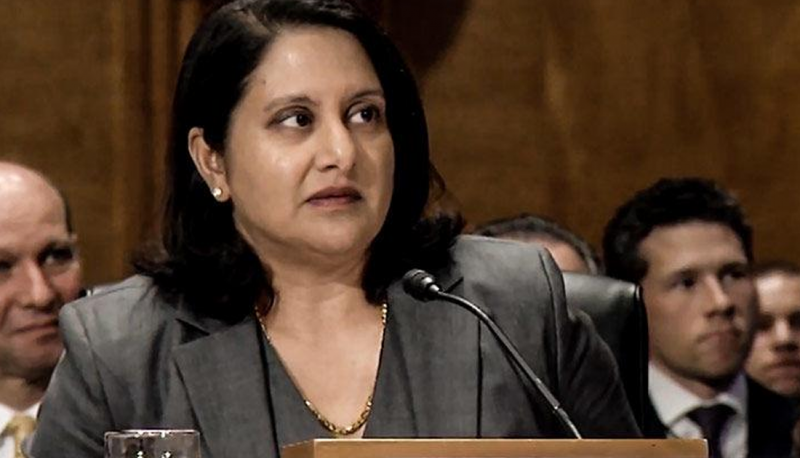“Confirmed Judges, Confirmed Fears” is a blog series documenting the harmful impact of President Trump’s judges on Americans’ rights and liberties. Cases in the series can be found by issue and by judge at this link.
Trump DC Circuit judge Neomi Rao argued in dissent that two shipping companies did not commit unfair labor practices in effectively modifying a contract without union consent and disciplining an employee, and that a finding of unfair labor practices by the National Labor Relations Board (NLRB) should be partially reversed. The majority disagreed and affirmed the NLRB decision in its August 2020 decision in Pacific Maritime Association v NLRB.
Pacific Maritime Association (“Pacific”) and Long Beach Container Terminal (“Long Beach”) are involved in shipping and cargo-handling at ports on the Pacific coast. Demetrius Pleas was working as a watchman for Long Beach and got into a work-related argument with a marine clerk, during which both engaged in racial name-calling. Although the argument appeared to have been resolved, the marine clerk filed a grievance against Pleas. Although Long Beach initially concluded that there was not enough evidence that Pleas had done anything wrong, Pacific and Long Beach (the “Employers”) agreed to participate in an arbitration proceeding under a provision of the collective bargaining agreement (CBA) concerning maritime clerks. Pleas and his union did not participate in the arbitration because they contended that the arbitration was not called for in their CBA, but the arbitrator conducted the hearing anyway and recommended that Pleas be suspended from work for 28 days. The recommendation was sustained, and the Employers barred Pleas from working, leading his union to file charges of unfair labor practices against the Employers with the NLRB.
The NLRB determined that the Employers committed two distinct but overlapping unfair labor practices, both of which resulted in them improperly disciplining Pleas. According to the NLRB, the Employers improperly and unilaterally modified the CBA with the watchmen’s union by subjecting Pleas to disciplinary proceedings not included in that contract, and they also unilaterally imposed a new condition of employment, making Pleas and other watchmen subject to the disciplinary proceedings in the maritime clerk CBA.
The Employers challenged the NLRB decision in the DC Circuit, and the court majority affirmed the NLRB. In an opinion by Judge Judith Rogers, the majority explained that under the law, it must show “great deference” and sustain the NLRB’s findings unless they are “not supported by substantial evidence” or reflect action by the NLRB that is arbitrary or contrary to established law. Based on that standard, the majority found that there was clearly “substantial evidence” to support the NLRB’s conclusion, which was based on the “plain text” of the CBAs and the principle that one party to a union-management contract cannot ‘unilaterally” change that contract.
Judge Neomi Rao partially dissented. Although she agreed that the Employers had improperly imposed a new condition of employment, she argued that the NLRB was wrong in finding that they had improperly modified the CBA with the watchmen. She claimed that the NLRB can find an improper contract modification only if an employer violates a “specific contractual term that plainly bars the actions taken.” Because the watchman CBA was “silent or at least ambiguous” as to the type of discipline imposed in this case, she went on, the Employers had a “sound arguable basis” for approving discipline of Pleas “apart from” the grievance procedures specified in the watchman’s CBA and the NLRB was wrong.
Judge Rogers’ majority opinion, however, explained that Rao’s dissent improperly “changes the question before the court’ in order to avoid the “plain text” of the watchman CBA. Rao’s answer, Rogers continued, “distorts” the NLRB’s standard for the “sound arguable basis” exception because it effectively ignored the language in the watchman CBA that the grievance and other discipline-related provisions in the CBA are the “exclusive remedy” for “any dispute.”,
Even if the majority had accepted Rao’s view, even she agreed that the Employers had committed one unfair labor practice by imposing a new condition of employment on Pleas and other watchmen. But her dissent would have undermined the NLRB’s decision and its ability to effectively discipline employers for committing unfair labor practices.

